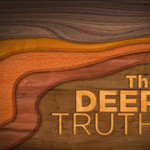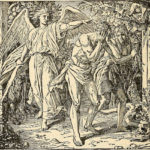We run our website the way we wished the whole internet worked: we provide high quality original content with no ads. We are funded solely by your direct support. Please consider supporting this project.
What is “The Flesh” or “The Sinful Nature”?
What is “the flesh”? The New International Version of the Bible translates Paul’s words for flesh (sarx) as “sinful nature” (Gal. 5:16). [This is the NIV 1984 version of the Bible which sold more copies than any other version than the King James Version.] In my opinion, this translation is unfortunate, for it gives the impression that believers carry around a sinful “thing”—a “nature”—against which they must forever be fighting. We normally think of a person’s “nature” as intrinsic and essential to him or her. So if believers have a “sinful nature,” it would seem to follow that whatever problems with sin we have must ultimately be a problem with who we essentially are. Part of our identity, this translation implies, is sinful. …
While the Bible is certainly realistic about the believer’s ongoing struggle with sin, it nevertheless speaks about a person who has trusted in Christ as being holy, blameless, righteous, and dead to sin. The believer is in Christ, not just positionally but actually. Though we may not fully experience or express it in the present, old things have passed away (2 Cor. 5:17)!
To suppose that our identity—our nature—is yet sinful is to deny the full force of this biblical truth. The implication … is that the “old man” is not really “old,” that we are not really completely in Christ, that we have not really been wholly crucified and resurrected with Christ, and that we are not really God’s children. As to our nature, this translation seems to imply that we are to some extent still “children of wrath” (Eph 2:3). …
If the flesh … is not a “sinful nature,” what is it? I submit that it is a deceptive state of being. The flesh is not a nature that is essential to someone’s identity. It is rather a deceptive way of seeing and experiencing oneself and one’s world and thus a deceptive way of living in the world. It is that way of thinking, and experiencing, and living that is conformed to “the pattern of this world” (Rom. 12:2 NIV). It is a way of existence that comes naturally to fallen creatures, but it is not itself a “nature.” Indeed, it is sinful and destructive, and believers are exhorted to live free of it, precisely because it is against the nature of God created in us and the new identity God gave us in Christ. …
Living in the flesh, then, is living in deception and thus in opposition to truth. It is living as though God is not who God really is, and we are not who the Bible says we really are. It is living to create worth, value, and fulfillment in our lives by what we can do, achieve, or acquire on our own rather than freely receiving our worth, value, and fulfillment from our Creator. This is the worldview that fuels one person’s materialistic desire to acquire more and more things and another person’s continual anxious efforts to improve his or her looks. It is this fundamental, deceptive assumption that leads one person to be preoccupied with achieving more than everyone else and another to be obsessed with procuring God’s favor through their particular religious beliefs or ethical behavior. It is, in short, the way of life that is controlled by the lie that says we can and we must find the fullness of our lives in what we do rather than simply in who we are because of who God is.
—Adapted from Seeing is Believing, Pages 34-36
Category: General
Tags: Flesh, Identity in Christ, Seeing is Believing, Sinful Nature
Related Reading

The Deep Truth
In last weekend’s sermon at Woodland Hills Church, Greg talks about the deep truth of your life that is real, but sometimes difficult to experience as real. How do we live in this deep truth when it’s so hard to feel it? You can download sermon audio, video and other resources on the Woodland Hills…

How Do You Balance Productivity and Spiritual Health?
In this episode Greg talks about balancing a productive life with a spiritually healthy one. Links: Book: Seeing is Believing http://traffic.libsyn.com/askgregboyd/Episode_0019.mp3

What is “Original Sin”?
I get asked about “original sin” quite a bit. Are people born guilty? Many times questions like this originate from folks who are worried about whether babies who die without being baptized go to hell. This is what I was taught as a young Catholic boy, and I have to confess I now find the…

Nothing but Christ Crucified
One of the most remarkable expressions of the all-encompassing nature of the cross is reflected in an incidental, but extremely important, comment that Paul made in his First Letter to the Corinthians. He noted that when he brought “the testimony of God” to Corinth, he hadn’t come “with eloquence or human wisdom”. He instead “resolved…

Making Resolutions? Consider This!
So, this is the time of year when we all look back at the year that is passing and look ahead to the new year in front of us. If you’re considering a New Year’s resolution, we wanted to make a tiny suggestion for your consideration. Greg has been fleshing out the ReKnew Manifesto in his…

How the Holy Spirit Changes Us
The Bible is full of stories of people who experienced the presence of God. If we are to experience something similar today, we must, through the Spirit, cultivate the spiritual capacity of an inner life to see and hear spiritual things. Paul wrote: Now the Lord is the Spirit, and where the Spirit of the…

